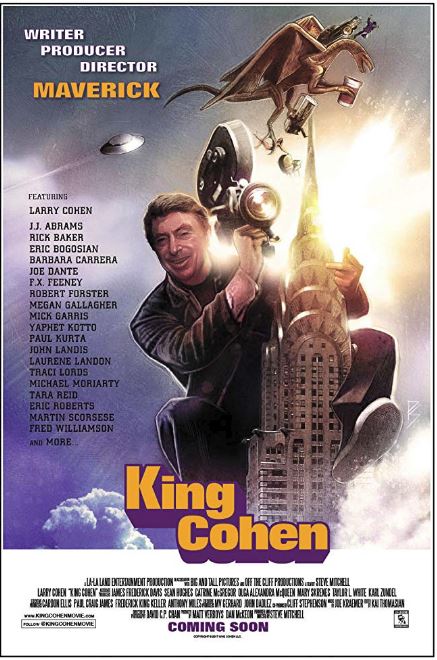
KING COHEN: THE WILD WORLD OF FILMMAKER LARRY COHEN is a loving, yet wildly entertaining portrait of the legendary creative force behind classics like THE STUFF, IT'S ALIVE, MANIC COP, and BLACK CAESAR. It is simply put, one of my favorite films I've seen this year (My review).
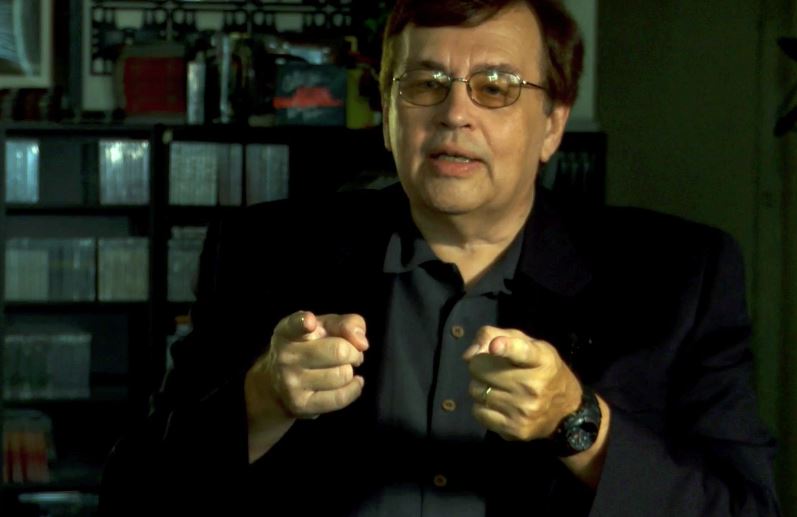
Wheels: How did King Cohen come together? How did the project get started?
Steven Mitchell: I was working in entertainment doing DVD special features and one day for reasons I have long since forgotten I was on the IMDB looking up something pertaining to Larry for some reason or another. I think what really impressed me, I knew Larry’s work and I knew his features and I knew his television work, I certainly knew his major credits. What I didn’t know was the length and breadth of his credits. I did not know he started at the very tail-end of the 50’s as a writer. I did not know that he worked in live television. I did not know all the TV movies. I am not entirely sure if they were busted pilots or they were pilots done as movies of the week. I had no idea the amount of his credits that I didn’t know.
That really made an impression on me. I was also thinking that it was time to do my own project. I enjoy doing special features work. In fact, I am still doing some of that stuff these days. I wanted to do my own feature. My standing and image was pretty good, so I went to the guys in the front office. I said - hey I have got an idea for a project. They said - it sounds great and why don’t you make and bring it to us when it’s done and maybe we will acquire it. Which was not entirely what I wanted to hear. I started to budget the project a little bit, looking into looking into the idea of using the clips and what it was going to cost me. At the time from the financial aspect, it was kind of daunting. I should have put the project on hold, but the idea never went away. Then when crowdfunding began, I sort of toyed with the idea thinking this Larry Cohen thing was a viable idea. I still wanted to do a feature project. I then tried crowdfunding which I was a spectacular failure at. I think there is a whole skill set at that I was certainly not aware of. I had the bump in the road there.
Then eventually I met my co-producer, a guy named Matt Verboys, socially. He knew my name because he said to me that we worked Comic Con. He asked me if you were the Steve Mitchel that co-wrote CHOPPING MALL. He said he was a huge fan. We got to know each other socially. Eventually, he said something about wanting to do other projects. He is the co-owner of LaLa Land Records. They are a soundtrack label that do all of these great limited-edition film scores. I am a big film score guy. I am a big music guy. I had really thought of them as a place to take KING COHEN. So, I called Matt and said let’s have lunch I have an idea. I explained that I wanted to do a documentation about Larry Cohen. He said he was already interested. By the time we were finished with lunch, he said to me, “I don’t know how we are going to do it, but we are going to do it”. That was how the project got started. Here we are a few years later and we lived in exciting timeS because we are about to have a theatrical release which frankly I did not expect.
W: It is certainly worthy of theatrical release. It plays so well with an audience. How did you go about contacting Larry Cohen and convincing him this was a good idea?
SM: Well, to go backward from when I had the idea to do the crowd-finding project I thought maybe I ought to get in touch with Larry and find out if he wants a documentary. Frankly, I could not believe that someone had not done a documentary about Larry. I believe CORMAN’S WORLD had come out and Roger was the most famous of the big movie producer/directors, but Larry is no slouch either. Larry had written, produced and directed about twenty movies on his own. I knew somebody who knew Laurene Landon (MANIAC COP) and I got Larry’s phone number I think through Laurene, who I met at a collector shop here in Los Angles. I realized I had to get in touch with Larry. It took me a day or two to sort of build up the courage to do it. I took a couple of deep breaths one and day and said alright, let’s give it a shot because Larry, while he does communicate through email, he is really a telephone type of guy. He is a little bit old-school. So, I called him up and he answered the phone which surprised me. I said, “Hi, I am Steve Mitchell and I am interested in making a movie about you. How do you feel about it?” He said, “Come on over to the house”. I went up to the famous house. As a fan of his work, I see the house and it is like deja vue all over again. He gets me a cup of coffee and I set down. I tell him I want to do it. There was no arm twisting necessary. He said it sounded like a great idea and I will help you any way I can if you can get it financed. I said great and then I went out to try and get it financed. Again, this was before I tried crowd-funding. My first attempts were not very successful, but the idea did not go away. That was the thing about this project. Once it got into my head, it never went away. Some idea you just kind of think maybe it is not time or maybe it is a bad idea. I never believe doing a documentary about Larry was a bad idea.
W: I think it so important to keep those names in the public’s consciousness. There are new film fans created every day. It is important to let those people know about the history of the genre film. With Netflix and streaming nowadays, it is easy to lose sight of the vast history genre films that are not readily available today. Documentary films like KING COHEN, gives the younger generation of film fan basically a “to-do” list of films to go out and discover. They may never see films like BONE, Q: THE WINGED SERPENT, and THE STUFF. They may not have ever discovered them, otherwise.
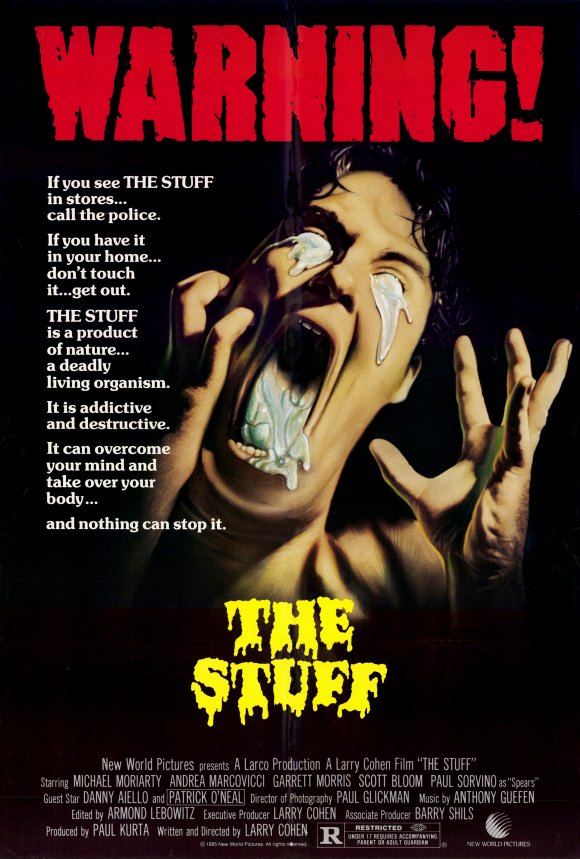
SM: I think we live in really good times if you are a film fan. There is so much that is available. There is so much in terms of library titles and back catalog titles that are available now as Blu-Rays, for example, and/or available with nice HD transfers on cable channels. If you have the Turner Classic Movies. If MGHD especially is a great channel because they have the rights to the AIP library, for example. I have seen awful syndication prints or bad video tapes that you can now see genre “classics” on MGMHD in these 1080p transfers that are taken from the original camera elements. You will go holy cow, I didn’t know those movies were so good. By the way as a sidebar, Larry has always said to me that when he was doing pictures at AIP that even the print that had never been run, supposed to be AIP prints, especially the stuff from the 70’s – color pictures, he always felt were kind of awful because Movie Lab which is a lab that doesn’t exist anymore. They did all of the stuff for AIP in the 70’s. He said the Movie Lab was such a cheap lab were so bad because they never changed their development baths.
W: Really?
SM: Yeah. You could go to a theater for example, say COUNT YORGA, VAMPIRE, the first show on the first day the print never looked terribly good because Movie Lab was such a bad laboratory. It was used a lot because it was a cheap laboratory. I know AIP used it and Paramount used it a lot in the 70’s to save money. So now when you see these old pictures and you see them high def. or on Blu-ray or on cable or streaming, it is a revelation to see Larry’s movies looking so good. It is fantastic. It is a great time to be a fan of all of this stuff.
W: I certainly agree. There is almost too much variety at times and things can get lost in the glut of streaming and home video options. Movies like KING COHEN can give film fans a check list of interesting films to seek out.
SM: I hope so.
W: Me, too. I sincerely love Larry’s work. What are your memories of interviewing Larry and spending time with him?
SM: Larry is a guy who likes to talk and so am I. Hour and days later we would still be in the same room talking. Going back to the interview process, one thing I learned right away was that all you needed to do is sit Larry in a chair, light, and say action. You almost don’t have to be there because Larry is the Energizer Bunny – he is going and going and going. He has an extraordinary memory. He loves to talk about his films and his career. I have often a made a joke that once you get Larry started that you could leave the room, go out and have a two hour lunch and come back and he would still be talking about his work. In all fairness, he has a very big filmography when you add in the TV work, an amazing filmography. Interviewing Larry was relatively easy. I had hundreds of questions. I did a lot of research, mostly revisiting things I had some familiarity with. There were one or two movies of his I did not see back in the day. I had never seen BONE, for example. I don’t think I had seen WICKED STEPMOTHER, believe or not. I had seen most of his pictures because once I discovered Larry as a filmmaker, I always looked for his credits. I always tried to be aware of his career as possible back in the day. I did not see THE PRIVATE FILES OF J. EDGAR HOOVER in the theater. HOOVER got a very spotty release initially. I think I saw on the CBS late movies. It was just a picture that was on one night and I liked FBI movies. I don’t know that I was aware that it was Larry’s picture, but it was a movie that looked interesting to me based on who was in it. I re-watched a few I had not seen more than once. I was prepared.
Talking to Larry was easy. We had hours and hours of footage. I think I did four sessions with him. When I interviewed his wife Cynthia, I might have asked him a few questions. Socially, as one movie fan to another and he is an enormous movie fan, we have had some spirited conversations in which we didn’t always agree. He once said to me, if I want you to disagree with me I will tell you. [laughs]
W: [laughs]
SM: I think he was a little surprised that I have such a strong knowledge of movies like he does. I think he would always say he knows more about movies than anyone else. I would say he might be more right than not. Although, Martin Scorsese would probably him a run for his money. I don’t think anyone knows more about movies than Martin Scorsese.
W: I would definitely like to watch that. I think it would fascinating to put the camera down and just watch them talk to each about cinema.
SM: Wouldn’t that be a treat?
W: It really would. This leads me to another question – how did you gather such an impressive panel of speakers for the film – Scorsese, Rick Baker, John Landis. You got that amazing story from J.J. Abrams that opens the documentary. It is such an impressive list of people.
SM: Like any movie, fiction or non-fiction, a great cast is a very important component. We knew, or we thought we knew, certain things about who we needed to have or who were the must haves. We knew Moriarty was a very important because Moriarty had done five projects with him. We knew that Fred was going to be a key component because Fred helped Larry become a success because Bone was not a success. We hoped to get Yaphet Kotto because Yaphet was the star of his first picture [as a director], BONE. Fred Williamson was relatively easy to get because Fred is available and around. Michael Moriarty was not easy to get. He was in a kind of self-imposed exile from the United States. When he left LAW AND ORDER, I think he had issues with Dick Wolfe and I think those issues were brought upon by a meeting with Attorney General Janet Reno. I think that created some friction. He decided he was going to move to Canada, which he did. He had not contact information in way of managers or agents or anything like. We were concerned about how we would find this guy because as small as the world is with the internet, if you don’t embrace the internet the world is still a big place and it is easy to hide. One day I was on Facebook and Lee Pfeiffer had written something about Moriarty. Leeis one of the editors of ‘Cinema Retro’ which is great magazine. It was an article about Moriarty and it mentioned that Michael was writing for a political blog. I think it was a Canadian blog. I wrote an email to the editor of the blog explaining that we were putting together the documentary and that we were looking to get in touch with Michael Moriarty. Literally, twenty-four hours later my phone rings and I see that it is a call from Canada. It was Michael Moriarty. We had a very pleasant conversation. He loved Larry. He said send me the questions because he didn’t want me to come to do an interview and he not have any answers for me. I send him 30 - 40 questions. He got back in touch with me and said he thought he could do it. My partner and I went up to Canada and did an interview with him which was a lot of fun. He is a charming, slightly eccentric kind of guy. I like him enormously right away. It was a very productive session. I was thrilled to find him and I enjoyed interviewing him. He was a key “get”.
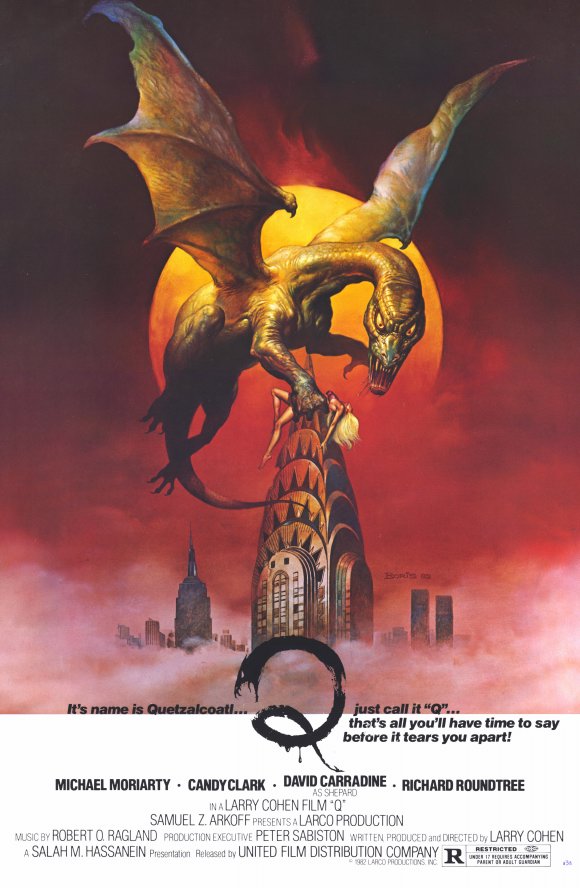
So, we had Fred and then Moriarty. Yaphet Kotto, who I believe was living out of the country. He was coming back to Los Angles. Yaphet really likes Larry. Larry said these guys are doing a documentary about me and they would like to interview you. Yaphet is a very interesting guy and does not do interviews. He said yes because Larry asked him, he was willing to talk to us. He then told me that Roger Moore had tried to get Yaphet to do some interview about a Bond movie. Yaphet said I don’t do this. [laughs] So the day we met Yaphet was a very interesting day. He was in a bit of a mood and we had to walk on eggshells a little bit to get him into a mood so that we could get him to the point he was just going to talk about the movie and talk about Larry a little bit. Once we got him to that point, he was a very good interview. He is very articulate, as you can tell. I think we talked to him at least an hour, if not more, just about Larry. I worked out pretty well. He was in a room with a bunch of MIDNIGHT RUN fans. We all said to him, “you are our favorite FBI agent. We all love Agent Moses”. I think he said he had seen the movie once. [laughs] I don’t think he ever went to a screening. I don’t think knew how much the audience like him. We kind of gave him “a little bit of a curtain call” that afternoon which don’t know he has ever had. I am a stone-cold MIDNIGHT RUN fan. I love that picture. My partners do as well. This is a long answer.
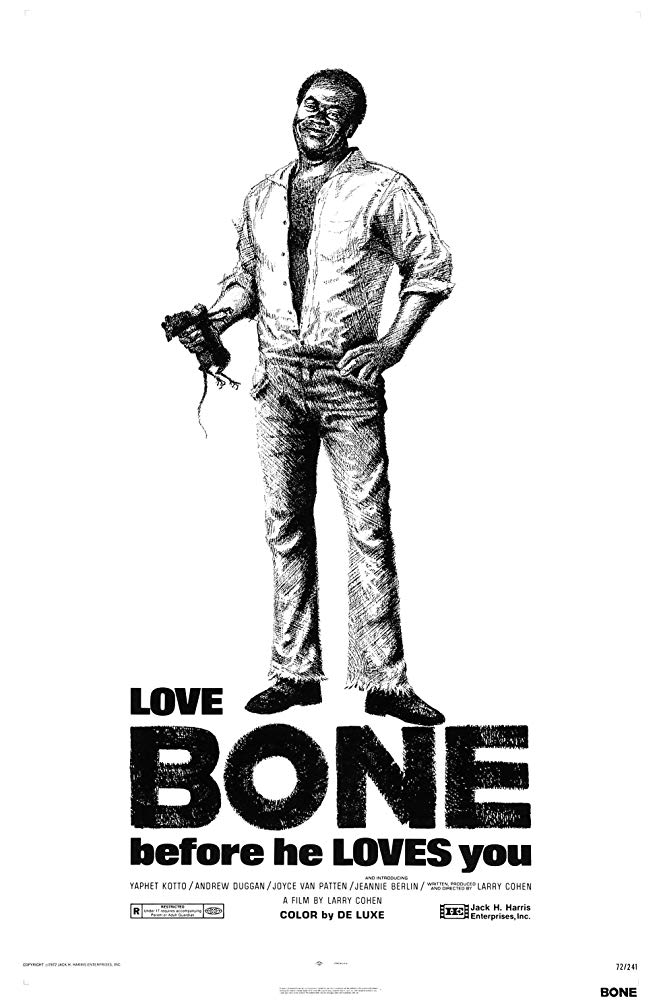
You sort of throw the requests out there into the world and hope people will say yes. There were a couple of people I didn’t get that I wanted. We wanted to get Charles Shoemaker, but at the time Charles was going through some personal publicity issues and did not want to talk to anybody on camera. Those are three that kind of slipped away. I would have enjoyed getting Quinten Tarantino to talk to us to us about Larry but he was not available to us. In terms of getting Scorsese, that was something that took us months. We were kind of relentless. What happened, very interestingly, we found out that he was about to the leave the country to go to Taiwan, I believe to shoot SILENCE. He was trying to get things done before he left. He was aware of our documentary and wanted to participate. He eventually got back to us and said what are we going to do about the Larry Cohen documentary? If I would have had to get on a plane and fly the red-eye with no sleep, I would have done it. I would have gone anywhere or anytime in order to do the interview. His solution was for us to send him the questions and I will get one of my guys to shoot it. We said – sure, okay. We sent him the question. He did the interview and sent us back the footage. I think he gave us about twenty minutes of footage and we used a great deal of it. We were very grateful, but if you were to ask what Martin Scorsese is like, I would say I don’t know because I never met him. [laughs] He did answer my questions. He was an important component of the film because he verbalized the whole idea of the renegade spirit. The movie is about Larry. I used Larry’s career as a spine to tell his story. Each movie represents a facet of his nature and who he is. The secondary theme of this picture is basically to celebrate the way movies used to be made – on the run, sometimes without permission or permits – but always in pursuit of doing good work, original work. So that is the secondary theme of the picture. That came out when we were cutting it, in no small part due to Martin Scorsese contributions. I am eternally grateful to him for that. And, hey, Martin Scorsese is in my movie! You mentioned J.J. Larry helped us get J.J. We tried for months to get J.J. and he was just not available to us. Larry just called him up and J.J. took the call. J.J. said okay and did our intro for us.
W: It is such a great intro.
SM: That is all due to Larry.
W: It starts off as just a joke and it engages you right away. It is a wonderful way to grab the audience’interest right off the bat. To go back to the idea of the renegade-spirit of filmmaking, that is one thing it does very well. It really inspires you to want to go and be creative. You think it is inspiring to hear how they did all these things and went through all these lengths just to get the shot or just to complete the movie. It makes you want to do and be creative. It is an inspiring thing. Let’s stick with the guest questions for a minute. I have to ask about Fred Williamson. I have to ask about “The Hammer”. The interview you crosscut with Larry as they were talking about each other and their experiences working together was the highlight of the film as they kind of contradict and talk over each other’s stories. Did they really contradict each other that much? Tell me a little bit about talking with Fred Williamson. What were your experiences with him? He is such a personality in genre films. His personality is almost as big as Larry’s.
SM: Well, “The Hammer” is a real character. The Hammer drives a Hummer with a license plate that says “Hammer” on it. Fred is a big fan of Fred, but he is a delightful guy. I think we talked to him on film for an hour and a half. He was very charming. We chatted with him about a whole bunch of stuff afterward. Like Larry, he is a great personality. He is an interesting personality. I know what Larry said about how he went about making the two BLACK CAESAR movies and Fred answered the questions. Very early on in the editing process, my editor Kai Thomasian [and I], we cut the Fred and Larry stuff. There is a lot of humor in the picture because there was a lot of humor in the interviews. Larry is a funny guy. Fred, as a character, is a very funny guy. I think Fred is fairly serious, but he also has a sense of humor. That stuff just started to come together. In fact, I don’t think we changed any of that after we cut it the first time. We put that stuff together pretty early on in the game. Then, as all good stories, we set something up in act one and you pay it off, in a sense, in act three. I was lucky that Larry had done ORIGINAL GANGSTAS for Fred and there was a little bit of, “well, I wanted to make this movie”. The Fred goes, “I wanted to make a Larry Cohen movie”. So that kind of give-and-take, that kind of sparring, between them was just the way it was. It was something, I think, they always did. Larry is very fond of Fred and Fred is very fond of Larry, as well. We took advantage of that.
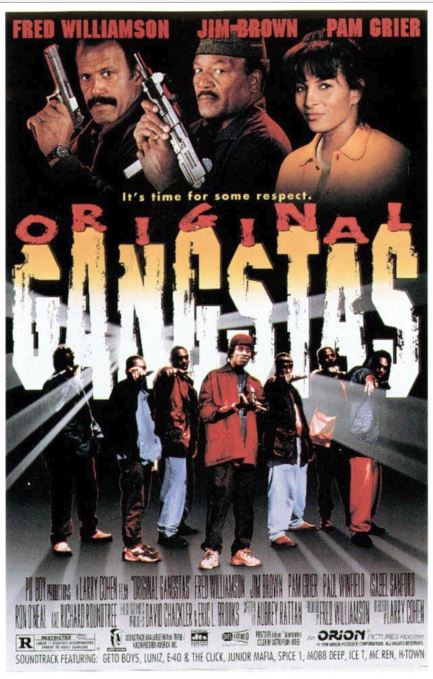
There was also another opportunity to do one of those he-said he said things with Moriarty – the whole thing with hair pieces. I am sorry. Growing up, my dad would always look for and spot bad hair pieces. He was the hair police when we were watching TV and movies together. So the idea of Moriarty wanting a different hairpiece for every movie and Larry having them in the closet and Moriarty saying “how dare he say that” was funny. You never cut funny anyway. We already had that he-said, he-said format. We took advantage of that with Moriarty, as well. These people have a sense of humor. These are humorous characters and why not take advantage of that for the film. I know the audience loved that stuff with Larry and Fred about jumping out of the cab. That has been a crowd pleaser everywhere the movie screened, which is very gratifying.
W: It is just so friendly and good-natured. They corrected each other and contradicted each other. With any other movie personality, it could have turned nasty or bitter. Here though, it is so jovial and good-natured, you can’t help but laugh. It is delightful. To me, it is the highlight of the film.
SM: The only thing that worried me a little bit is it’s in the front third of the picture. It sort of worries a filmmaker a little bit, that you give the audience the best moment too early. That was something I was concerned about. Ultimately, because we were able to pay it off later it did not turn out to be a problem with the audience. The portrait of Larry we tried to create is constantly evolving in the picture. Larry is more than just funny antidotes. He is guy who is dedicated. He has heart. The movie is probably a little serious … towards the end.
W: I think that is one good thing about it. Larry is this lively character and a real creative force but he also seems to be a very humane and kind person. I think the fact that you can show that along with all the other zaniness around him is one of the better things about the film. It is a nuanced portrait of him, while still being wildly entertaining. I think it is a wonderful portrait. I am sure he loved it. It is such a loving tribute to the man. You spoke about the rights to the clips early on. You used an amazing amount of clips from throughout his career. What were some of the challenges in being able to gather it all together and clear all the rights to use them? I have seen a lot of entertainment documentaries, on the festival scene, that never got released because they couldn’t clear the rights to the clips used in them. How did you go about getting all or those cleared and paid for?
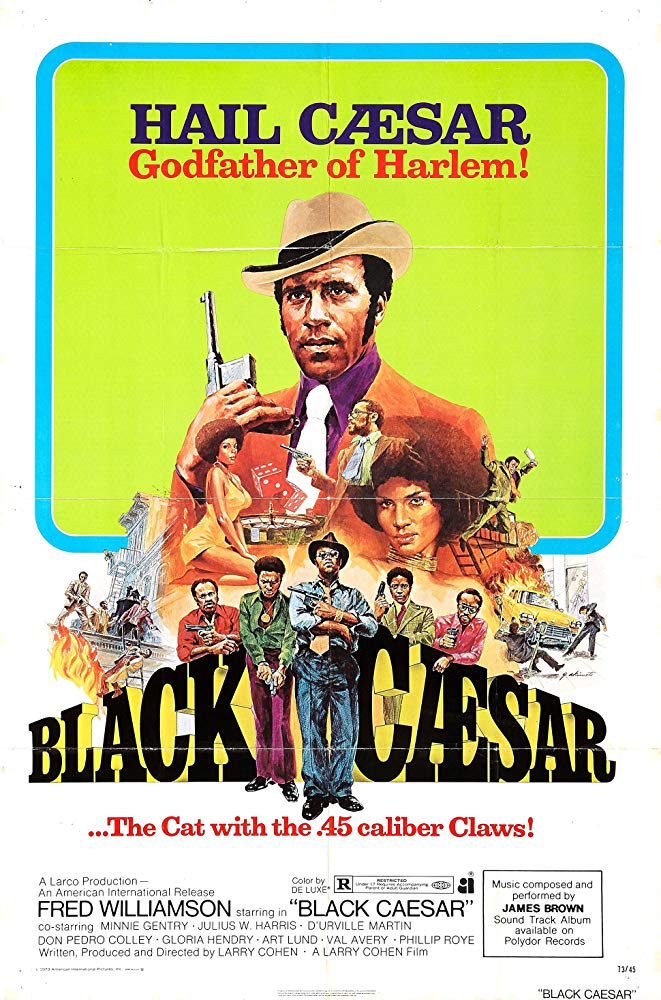
SM: There is a law that we discovered that has been in existence for a long time called Fair Use. The Fair Use law exists to help film makers like me, ultimately. Basically what happens is that you hunt and gather and put the movie together. Once you have your cut, you get in touch with lawyers that specialize in Fair Use. Our lawyers not only specialized in Fair Use, they are firm that is basically at the vanguard of Fair Use law. So much so, that every three years or so the government reviews Fair Use law. The firm we hired are always going to Washington to continue to expand the Fair Use laws. They have really been out there on the frontline helping to determine what Fair Use Law is. As long as you meet the criteria for Fair Use, we are essentially good to go. There are a lot of documentaries being made these days which take advantage of Fair Use. We are not the first and are far from the last. It is a great environment if you are a documentary film maker because as long as the clips are being used in a way to demonstrate a point, you are pretty much okay. In fact, I think when we did our Fair Use review we only had to scale back just a few clips. We really for the most part aced the whole Fair Use process fairly easily. The lawyers came back and said this clips needs to be shorter or I am not sure about that clip maybe if you make it shorter it will be okay. I was that kind of thing, it was not – you can’t use that or that is not good. As long as you don’t use the clip for entertainment purposes, you fall under the Fair Use. That is why today you get more and more entertainment documentaries being made.
Back in the day, when I first looked into it … there was a whole sliding scale and it was prohibitive. There was no way I could make the movie using the clips if I had to pay for every clip. Each clip had domestic and world-wide, domestic for 3 – 5 years, world-wide for 3 -5 years or domestic for forever or world-wide forever. They had a whole big laundry list of prices for clips just at Warner Brothers. I was going – there is no way we can do this. There is no way we can afford this. I initially wondered if we could get away with making this movie without using a lot of clips. Larry had a pretty big archive of material in the way of behind the scenes stuff and the stills that are in the picture. I knew I had that. Stills are essential promotional materials. I think legally, things with them are a little different. Once I became aware of Fair Use, I just said we are going to do it the way we want to do it. You have to spend a good amount of money to get the picture through Fair Use but we did and it went really well. A lot of contemporary film makers are using Fair Use as a way to make these types documentaries. We are far from the only ones. In fact, my partner Matt and I watched a number of documentaries that were made with Fair Use. It is a good time to be doing what we are doing. It is a lot easier financially to get it done.
W: What was your biggest take away from spending so much time with Larry?
SM: My biggest take away? My biggest take away is that I think he had the career he had because he had an extraordinary belief in his own talent. He was also relentless. No was never an option for Larry. We touch on this in the movie when they say that is not how it is done. Larry says - screw that. I am going to do it how I want to do it. I think the big take away is that if you are going to succeed in the movie business, you can’t let anyone tell you that your movie or your project was a bad idea. In fact, one of my best friend, years ago, and I were having a conversation around the crowd funding days. He said to me, now he was coming from a place of caring, do you think anyone really gives a shit about Larry Cohen? I said I don’t know, but I know that I certainly do. I think he is interesting. I think he is worth doing a documentary about. I guess that thing that I have and Larry has for over twenty pictures and hundreds of scripts – he believed in the project. You can’t let anyone talk you out of climbing up the tree. I think that is who Larry is. No one could talk Larry out of climbing up the tree, even if it was a bad idea. That was a big take away for me. The other thing is that he is a fun, funny, nutty kind of guy. Once a standup, always a standup. It is still part of his DNA. The other thing is that he and I related because he is an enormous movie fan. I always say that movies are my religion and the theaters are my church. For Larry that is true. Larry and I both grew up in New York City and went to the movies all the time. We have that in common. That was my big take away. Larry is sort of relentless in the pursuit of his own work and his believe in his own work. Everybody wants to tear a project down. You are never going to make any money. Oh, it is a bad idea. If you allow the naysayers to get in the way of the project, how is anything every going to get done? Somehow, you just have to say – screw everybody, I am going to do this. In some degree, that is what I did KING COHEN. I just said, well I still think this is a good idea for a project. That is why we are having this conversation. I never gave up on that.
W: I am certainly glad that you didn’t. As I said, I think it is an amazing documentary. I am recommending it to people I know – film journalists and film fans. I hope a new legion of film fans discover Larry and his amazing body of work. Which leads me to one of my final questions for you, what is your favorite Larry movie?
SM: I get asked this a lot and the answer is Q: THE WINGED SERPENT. It is just a crazy, nutty, ghoully movie. It is a monster movie. It is a New York movie. It is political. It is a street crime movie. It is funny. You have guys shooting machine guns from the top of Chrysler Building, for crying out loud. It just has all these crazy elements that Larry threw in the blender and stirred it up and out came this crazy movie. Anchored by a remarkable performance by Michael Moriarty. When Larry was going to direct his movies, he didn’t always have complete scripts. As Moriarty said, there was a lot of Jimmy Quinn on the page but what Larry did was take Moriarty and put a lot of Moriarty into Quinn. The character and the actor was very much in sync, maybe more so that you would normally find in a picture. It is anchored with a great character, a fascinating character. Jimmy Quinn is a great character. It just has all of this great nutty New York stuff. I am from New York, so I dig it. I love it. All of that being said, a close second is THE AMBULANCE which in a lot of way does a lot of the great genre bending stuff that Q does. THE AMBULANCE is just an outrageous idea that is Larry’s stock-and-trade. It is funny. Its protagonist is a comic book artist. A lot of the ambulance stuff was done in New York City which is not something you see every day on the streets. It is also sort of a sweetheart love story. Here is this guy who meets this girls and falls in love with her the moment he sees her. He is willing to do almost anything to find her and save her. It is good-hearted as well as everything else. I like THE AMBULANCE a lot. I saw THE AMBULANCE on cable one night and I did not know it was one of Larry’s movies. When I saw it was a Larry Cohen picture I said oh my God. I have since seen the picture with audiences. If you can see that movie in a theater with audiences, that movie is even more enjoyable. Larry always said he made his movies for an audience. He wanted people to see the movies in a theater. What is nice that over the years I have been able to see more and more of his movies in theaters with an audience. He is right. It makes a difference. Every movie plays better, especially if the audience likes it, in a theater. I have been lucky that I have seen KING COHEN in five different cities with five different audiences. I saw in Los Angles. We had a cast and crew screening at the Egyptian in Hollywood toward the end of last year. It is great to see your movie with an audience. I look forward to sneaking into a couple screenings once the movie opens out here just see how the audience is enjoying it.
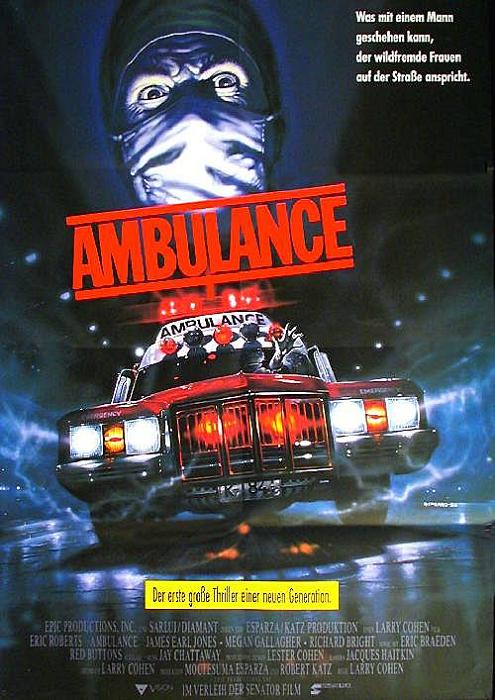
W: I have ome last question for you, what is next for you? Are you working on more personal projects that you want to let the readers of AICN to know about?
SM: I am a little superstitious. I don’t like to talk something before it is in at the basement level. I have five or six documentary ideas that I would like to do. I am also a writer. I have a pilot that I hope is circulating right now. I am just a creative person. I like to work. It doesn’t matter what it is. If you said if documentaries are the only thing you were going to make for the rest the years, how would you feel? I would say great! Story telling is story telling for me. It doesn’t matter whether it is fiction or non-fiction. The reason why KING COHEN is finding an audience is that people are finding that at the core of it is a really interesting character. Think of all the movies you really like, I would bet that most all of them, if not all of them, have very interesting characters. Larry is an interesting character. I knew the career was going to be good. I didn’t know if Larry was going to be as interesting as he turned out to be. If I make those types of films, films about films, my nature is such I would always be doing something about film history. Getting the finances is the tough part. We are working on trying to get the next one lined up. I guarantee when we do, we can talk again.
W: I would love that! There are more questions I would love to ask you. This was a great experience. I think KING COHEN is one of the best documentaries about genre films I have ever seen. I think it will definitely make new fans.
SM: I hope so. I want everybody on the planet to see the movie. A lot of people who have seen the movie, for example our Fair Use lawyer, didn’t know who Larry was, said this guy is really interesting. The people who are not genre fans or are not Larry fans, kind of become Larry fans on one level or another after they see the movie which is very gratifying to me and very, very gratifying for Larry. You don’t normally get people come to you at this point in your career and say – I really liked your movies, this is really interesting. So if in any way, if I could turn the spotlight on Larry and shine it on him, I am very happy. A lot of the wives of guys who know his work are saying – he is really interesting, he is really funny. If you can get non-genre fans onboard, you must be doing something right.
W: I think you were definitely doing something right. Thanks again for speaking with me.
SM: My pleasure. Anytime.
______________________
KING COHEN is currently playing theatrically in L.A. with more cities to be announced in the coming weeks. Check http://KingCohenMovie.com/ for more details.
-Wheels

